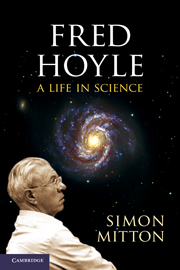Book contents
- Frontmatter
- Contents
- FOREWORD
- PROLOGUE
- 1 AN END AND A BEGINNING
- 2 TRAINING FOR COSMOLOGY
- 3 THE STAR MAKERS
- 4 HOYLE'S SECRET WAR
- 5 THE NATURE OF THE UNIVERSE
- 6 LIVES OF THE STARS
- 7 CLASH OF TITANS
- 8 ORIGIN OF THE CHEMICAL ELEMENTS
- 9 MATTERS OF GRAVITY
- 10 MOUNTAINS TO CLIMB
- 11 THE WATERSHED
- 12 STONES, BONES, BUGS AND ACCIDENTS
- ACKNOWLEDGEMENTS
- NOTES
- BIBLIOGRAPHY
- INDEX
- Plate Section
5 - THE NATURE OF THE UNIVERSE
Published online by Cambridge University Press: 03 May 2011
- Frontmatter
- Contents
- FOREWORD
- PROLOGUE
- 1 AN END AND A BEGINNING
- 2 TRAINING FOR COSMOLOGY
- 3 THE STAR MAKERS
- 4 HOYLE'S SECRET WAR
- 5 THE NATURE OF THE UNIVERSE
- 6 LIVES OF THE STARS
- 7 CLASH OF TITANS
- 8 ORIGIN OF THE CHEMICAL ELEMENTS
- 9 MATTERS OF GRAVITY
- 10 MOUNTAINS TO CLIMB
- 11 THE WATERSHED
- 12 STONES, BONES, BUGS AND ACCIDENTS
- ACKNOWLEDGEMENTS
- NOTES
- BIBLIOGRAPHY
- INDEX
- Plate Section
Summary
For about a quarter of a century, from 1948 to 1972, Fred Hoyle was one of the most famous astronomers in the world, renowned in the public eye not so much for his solid achievements in astrophysics as for his revolutionary ideas on the origin and nature of the universe. In Britain, Hoyle enjoyed two decades of being one of the best-known scientists in the country. His controversial ideas and the disputes they caused were often in the media. The series of events that would turn him into the world's most quoted cosmologist began during his war service.
When he decided to make a career in theoretical astronomy rather than nuclear physics, Hoyle originally gave cosmology a wide berth. He afterward claimed that, in the late 1930s, it seemed inconceivable to him that something as vast and complex as the universe could be understood on the basis of the sparse observations that had been made up to that time. By today's standards, astronomers then knew little about the universe. Edwin Hubble had shown that spiral galaxies contain stars and are very much like the Milky Way. He had discovered the relationship now known as Hubble's law: the more distant a galaxy is from the Milky Way, the faster it is moving away from us. Expansion of the universe offered a natural explanation for this link between the distances of galaxies and their speeds of recession.
- Type
- Chapter
- Information
- Fred HoyleA Life in Science, pp. 108 - 141Publisher: Cambridge University PressPrint publication year: 2011
- 1
- Cited by



